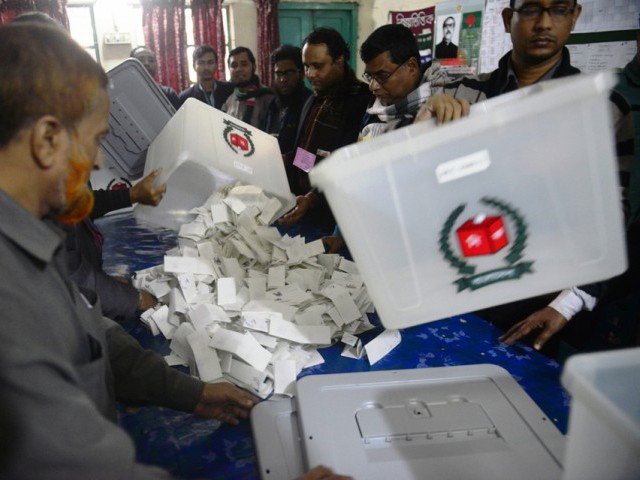On 28 December, 2016, district council elections were held in Bangladesh. 61 districts were scheduled to go to polls which were boycotted by major opposition political parties. Candidates were from ruling party Awami League only, even though contestants of 2 districts had been elected unopposed, and another twenty-two Awami League affiliated chairmen candidates have been elected uncontested. Although incidents of polls code violation, coercion, and open bribing were reported in many districts, but the Election Commission asserted that the polls were free and fair and one of the exemplary elections.
Comment:
The government’s endeavor to revive the 130-year old dormant district councils by electing its members has been portrayed as something historic which will strengthen democracy in Bangladesh. General people of the districts have not voted to elect the council members; rather elected representatives of local government bodies of the district – upazila councils, union councils, municipalities, and city corporations – have casted votes. Whereas we have observed early this year that how Awami League managed to snatch victory in local union councils and upazila council elections, that is, through mass violence and flexing muscle power which cost lives of nearly hundreds of people. Hence, these district council elections cannot be claimed as free and fair at all since the voters of the elections were earlier elected through mass crime and violating laws. Through this election, a set of notorious politicians elected another set of notorious politicians to secure their mutual interests.
Some cheap intellectuals are praising the initiative of this election as they believe it will create more scope for accountability which will further institutionalize democracy into grassroots level. But the question is who will account whom as they all are the birds of the same flock. Reality is that Hasina has no intention to endorse accountability into any of the political structure of the country; rather she fears peoples’ voice that has been evident after she assumed power in 2008. She illegitimately banned sincere and popular political party Hizb ut Tahrir and kept persecuting its members till today as they are challenging her heinous acts through words and peaceful actions. This tyrannical government has no room for accountability; it wants to rule the country with atmosphere of fear and intimidation. Hasina’s thugs are in a continuous pursuit of unlawful arrest, imprisonment, abduction, and killing to ensure this environment of fear and terrify the general people so that they never raise their voices against her despotism. Power monger Hasina is desperate for absolute authority through securing Awami dominance countrywide by any means. And the primary objective of these district council elections is to empower Hasina’s local political thugs to realize her local agenda and suppress any future unrest against her unjust rule.
Secondly, another point needs to be remembered that local Awami leaders and their supporters have no ideological bondage with the party; they exist only to secure their personal interest to make fortunes. As Hasina is using her local political thugs to subdue the masses, she has to compensate them by means of financial benefits and administrative posts in government. In order to accommodate many greedy Awami leaders, Hasina is under pressure to create more public offices for her hooligans. Hence after assuming power through a voter-less election in 5th January, 2014, she now desperately is trying to accommodate as many local Awami leaders as possible in different positions of the local governments. District council is one of such heinous projects of Hasina to accommodate and rehabilitate her dissatisfied local gangsters.
People need to understand that such elections cannot make an iota of change in favor of the general people because local governance system of a country is intrinsically connected with the central ruling system of the country, and it is based on the same political ideology and philosophy. For Bangladesh, it is the secular capitalist democratic system resulting in elitism and selfish politics which produces greedy politicians for whom politics is merely a means of profitable business. For them, elections happen to be good investment scope to ensure good lucrative return through looting public money. District council members emanating from the secular democratic system would not make any change unless the very corrupt secular democratic system is uprooted and replaced with a just ruling system which is the Khilafah (Caliphate) on the method of Prophethood.
Shirazul Islam
Member of the Media Office of Hizb ut Tahrir in Wilayah Bangladesh

